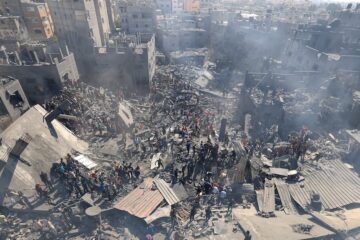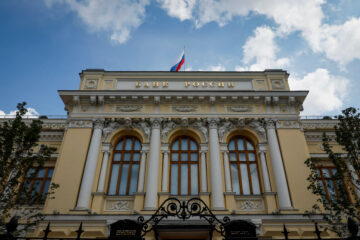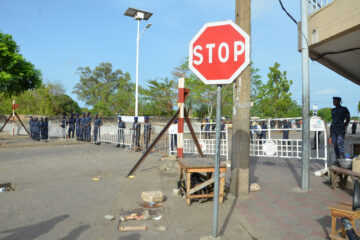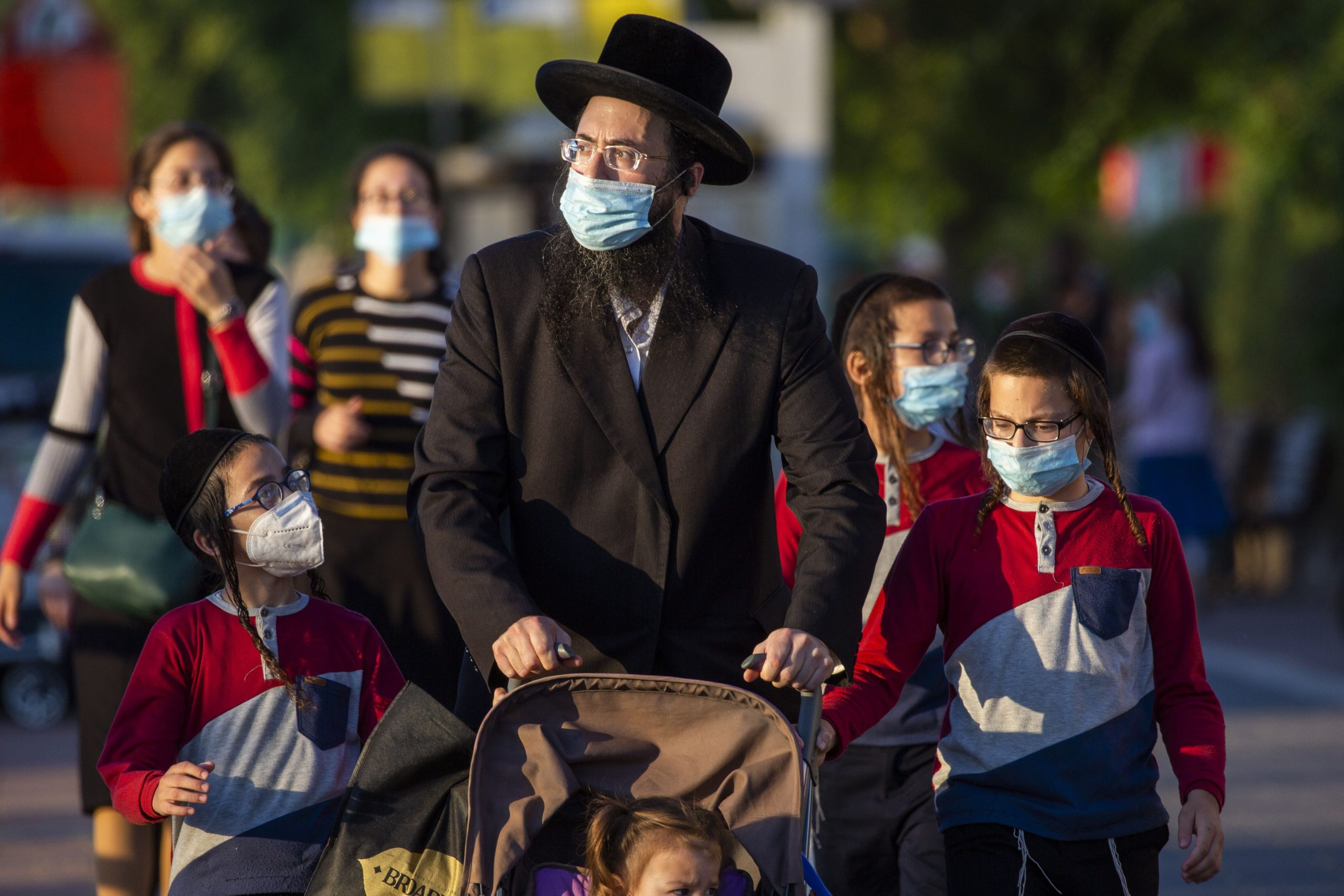Besieged Ukrainian port defies Russian order to drop weapons
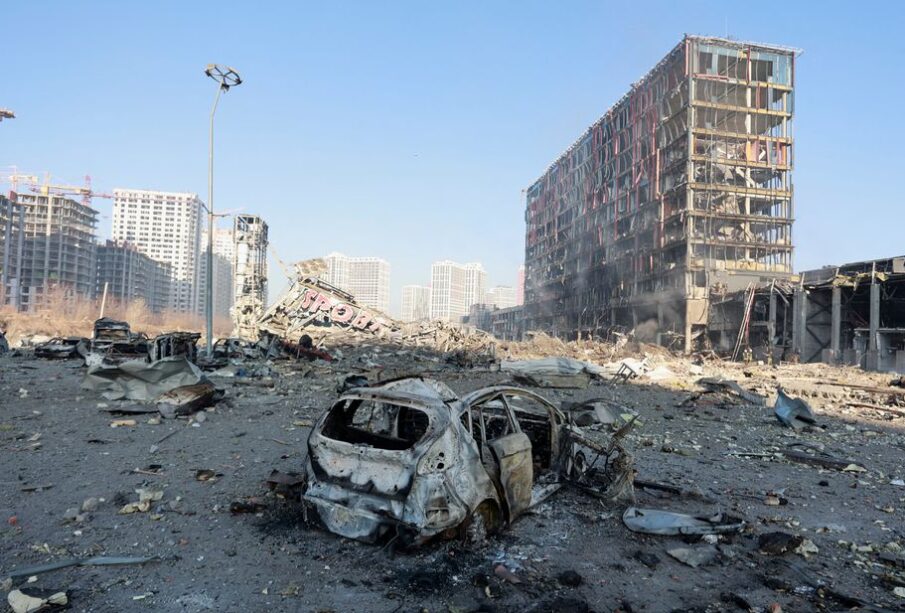 A view shows a destroyed car at the site of a shelling of a shopping center in the Podilskyi district of Kyiv, as Russia's invasion of Ukraine continues, in Kyiv, Ukraine March 21, 2022. REUTERS/Serhii Nuzhnenko
A view shows a destroyed car at the site of a shelling of a shopping center in the Podilskyi district of Kyiv, as Russia's invasion of Ukraine continues, in Kyiv, Ukraine March 21, 2022. REUTERS/Serhii NuzhnenkoUkraine defied Moscow’s demand for its soldiers to lay down arms before dawn on Monday in besieged Mariupol where hundreds of thousands of civilians are cowering from Russian bombardments laying waste to their city.
Russia’s military had ordered residents of the southeastern port to surrender by 5 a.m., saying those who did so could leave, while those who stayed would be handed to tribunals run by Moscow-backed separatists.
President Volodymyr Zelenskiy’s government responded that it would never bow to ultimatums and cities such as the capital Kyiv, Mariupol and Kharkhiv would always defy occupation.
“There can be no question of any surrender” in Mariupol, responded Ukrainian Deputy Prime Minister Iryna Vereshchuk.
Russia’s invasion, now in its fourth week, has largely stalled. It has failed to seize any major city much less capture Kyiv or swiftly topple Zelenskiy.
But Russia has caused massive destruction to residential areas, particularly in Mariupol on the Sea of Azov which was home to 400,000 people. It has run short of food, medicine, power and water since the first days of the war.
Ukrainian Defence Minister Oleksii Reznikov praised the city’s “heroic defenders”, saying their holdout had helped thwart Russia elsewhere.
“By virtue of their dedication and superhuman courage, tens of thousands of lives throughout Ukraine were saved. Today Mariupol is saving Kyiv, Dnipro and Odesa.”
A part of Mariupol now held by Russian forces, reached by Reuters on Sunday, was an eerie wasteland. Several bodies lay by the road, wrapped in blankets. Windows were blasted out and walls were charred black. People who came out of basements sat on benches amid the debris, bundled up in coats. read more
A group of men dug graves by the roadside.
In one dark cellar packed with families, Irina Chernenko, a university librarian, said she had been there for 11 days.
“Everything is destroyed. Where can we go?” she said. “We’re cooking over a fire – for now we still have a bit of food and some firewood.”
‘IT’S HARD FOR ME TO SPEAK’
Russia calls the war, the biggest attack on a European state since World War Two, a “special military operation” to disarm Ukraine and protect it from “Nazis”.
The West calls this a false pretext for an unprovoked war of aggression by President Vladimir Putin.
Nearly a quarter of Ukraine’s 44 million people have been driven from their homes, including 3.4 million fleeing abroad, according to the United Nations, in one of the fastest exoduses ever recorded.
A U.N. tally includes more than 900 civilian deaths but the true total is unknown.
Thousands of Russian and Ukrainian troops have also died, and Russia’s artillery-heavy army has suffered large losses in tanks and armour. Five Russian generals have been killed, a loss of senior commanders in such a short period almost unheard of in modern warfare.
In Kyiv, six bodies were laid on the pavement by a shopping mall struck overnight by Russian shelling. Emergency services combed wreckage to the sound of distant artillery fire.
Firefighters put out small blazes around the building, hunting survivors. Ukraine said at least eight people died.
“It is hard for me to speak because my child worked here. She was at work just yesterday,” said tearful onlooker Valentina Timofeyevna.
Russia said the centre was being used as a weapons store. Ukraine said there were no strategic military objects in the area. Neither report could be independently verified.
Officials imposed a day-and-a-half curfew in the capital from Monday night, citing the likelihood of more shelling. Britain said there was heavy fighting to the north but that Ukrainian forces had fought off an advance and most Russian forces were more than 25 km (15 miles) from the city centre.
TALKS RESUME
Ukrainian officials hope that Moscow, having failed to secure a quick victory, will cut its losses and negotiate a withdrawal. Both sides hinted last week at progress in talks on a formula which would include some kind of “neutrality” for Ukraine, though details were scarce.
Talks resumed on Monday, starting with a 90-minute video conference.
Apart from Mariupol, the eastern cities of Kharkiv, Sumy and Chernihiv have been hardest hit by Russia’s tactic of pounding urban areas with artillery as its troops have done before in Syria and Chechnya.
Kharkiv Mayor Igor Terekhov said hundreds of buildings, many residential, had been destroyed in Ukraine’s second largest city. “Kharkiv will survive,” he said. “It is impossible to say that the worst days are behind us, we are constantly being bombed.”
Western sanctions have cut Russia off from the global financial system to an unprecedented degree for a big economy.
But the European Union, Russia’s main customer for energy, has so far made an exception for exports of oil and gas. EU foreign ministers disagreed on whether and how to include energy in sanctions, with Germany saying the bloc was too dependent on Russian oil to declare an embargo.
SOURCE: REUTERS

